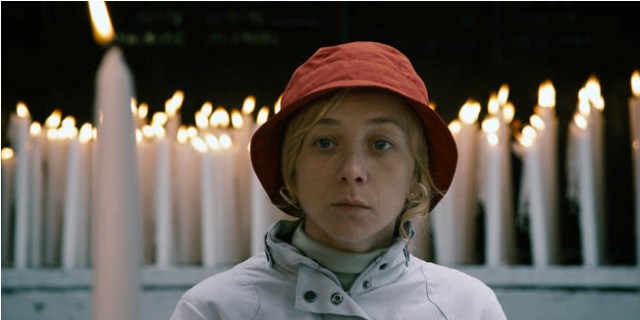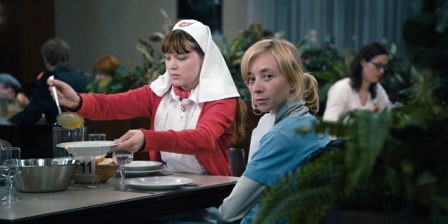CHICAGO – In anticipation of the scariest week of the year, HollywoodChicago.com launches its 2024 Movie Gifts series, which will suggest DVDs and collections for holiday giving.
Haunting ‘Lourdes’ Revels in the Poetry of Ambiguity
 Rating: 5.0/5.0 |
CHICAGO – Most films about faith seem artistically limited by their spiritual subject matter. Some religiously devout filmmakers are so fixed in their beliefs that they lack the ability to perceive life with the complexity necessary to create resonant art. A perennial classic like Cecil B. DeMille’s “The Ten Commandments” may have magnificent scope and spectacle, but it has all the dramatic depth and nuance of a Bible card.
What makes a film like “Lourdes” so mesmerizing, apart from its exquisite acting, cinematography and direction, is the fact that it’s the work of a filmmaker who doesn’t claim to have all the answers. Writer/director Jessica Hausner is uninterested in spoonfeeding superficial enlightenment to her audience. Yet she also has no intention of mocking Catholicism, or any other religion, with self-congratulatory satire or blasphemous put-downs. Though her film has been described as a “dark comedy,” it is far more serious and even-handed than such a term would suggest. With so many formula films playing in theaters, it’s riveting to see one that defies all expectations.

Lourdes
Photo credit: Palisades Tartan
Sylvie Testud, the beguiling French actress of films such as “Fear and Trembling” and “La vie en rose,” stars as Christine, a young wheelchair-bound woman whose disease, multiple sclerosis, has isolated her from the rest of the world. She’s one of many ailing souls making a pilgrimage to Lourdes, a small town in the Pyrenees Mountains where the Virgin Mary is said to have appeared and healed faithful mortals since the mid-1800s. Thus, Lourdes has gained the reputation worldwide for being a site where miracles take place, though any reports of supposed divine intervention are investigated by a medical committee to scientifically determine whether they are indeed acts of God. Christine is initially embarrassed to be seen among such pious people, and has embarked on the journey mainly to escape her loneliness. Her assigned caregiver is Maria (Lea Séydoux, whose broodingly lovely face briefly appeared in “Inglourious Basterds”), a reluctant volunteer who would rather be gossiping about boys than caring for the sick.
 Lourdes Photo credit: Palisades Tartan |
Though this may sound like the setup for a series of cynical laughs, Hausner refuses to judge her characters, or turn them into cardboard caricatures. Even the stern lead helper, Cécile (Elina Löwensohn), is not the Nurse Ratched clone that she seems to be, with her shushing technique evocative of a sprinkler system, and disparaging remarks that deflate the hope in all who encounter her. Cécile is merely one of the town’s inhabitants who suffer from quiet desperation. Local souvenir shops have commoditized the Virgin Mary just as the town has sold the possibility of miracles. The physically and mentally ill have traveled there from around the world with the hope that maybe, just maybe they’ve lived a spiritual enough life to make them worthy of a miracle. Yet God’s voice often seems as silent and as archaic as the surrounding landscape. Cinematographer Martin Gschlacht makes excellent use of the actual locations, capturing unforgettable images of countless pilgrims making their way past motionless statues as ancient as the land itself.
I will refrain from describing the second act of this picture, and allow you to discover and interpret it for yourself. Testud, looking like a grown-up Saorise Ronan, has a hypnotically subdued face that makes every subtle expression seem as intricate and open-ended as Mona Lisa’s smile. Her character does undergo a transformation of sorts, and it’s every bit as internal as it is external. Early on, a priest tells her that the soul must be healed before the body, and that she must open her heart to Christ in order to receive his blessing. This key exchange underlines the central question of the film: how does one become worthy of a miracle? Though some visitors to Lourdes began to experience encouraging improvements to their health, their symptoms quickly relapsed afterward (as is often the case with some illnesses that go through cycles of remission).
There are several thematic and stylistic elements in the film, including its sterile interiors, that bear striking similarities to Todd Haynes’s 1995 masterpiece “Safe.” That film was about a woman who develops deteriorating allergies to her suburban environment, and seeks help at a wellness center where gurus inform her that she is responsible for her own disease. Haynes’s film was much more blatantly satirical than “Lourdes,” though Hausner shares his skepticism of institutional power and influence. She’s less interested in the validity of miracles than she is with the the importance of a faith in miracles, and how it effects the souls of the afflicted. In the world of “Lourdes,” happiness and enlightenment are impermanent and fleeting, but hope and faith are everlasting.
 | By MATT FAGERHOLM |


